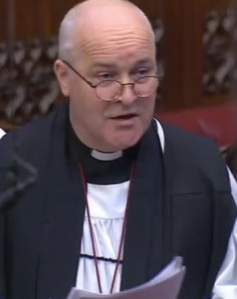The Archbishop of York asked a question on the issue of face masks being worn at protests on 13th February 2024, following a government statement on new measures being introduced to police these activities:
The Lord Archbishop of York: My Lords, like others, I entirely share the views about war memorials and their desecration, and fireworks and flares—there is a lot that is sensible in this. On face coverings, what concerns me is the law which we often do not often think about—the law of unintended consequences. To those dissidents, I would add religious minorities to the list of those who may be concerned about this. I wonder whether the effect of this will be that more people will wear face coverings, not fewer, because they are concerned about facial recognition. I find it hard to understand why this should be a matter for the law. If somebody commits a criminal offence while on a march, we already have the powers to deal with them. If somebody on a peaceful protest chooses to wear a face covering, I find it hard to understand why that, in and of itself, is a problem. The Minister has explained that this will be used only under certain circumstances, but if I have heard him correctly it is around the “risk” of criminal activity and violence. We do not arrest people because we think that they might be doing something. If the protest is peaceful, why should somebody not wear a face mask? I am struggling to understand why this has become such an issue, and I am concerned about minority groups who could be adversely affected by this.
Lord Sharpe of Epsom (Con, Home Office): The current legislation gives police the power to direct people to remove face coverings in designated areas and to seize face coverings, but there is a loophole, in that an individual could follow the direction of an officer to remove their face covering but then move to a new area and redeploy the face covering. We are trying to close that loophole. I take the most reverend Primate’s point about minorities and so on, but, as I have tried to explain, this is being applied to protests only where there is an authorisation in place, so it is time-limited and very specific.


You must be logged in to post a comment.